Restoring Your Dog's Gut Health: How to Use CBD for Digestive Disorders

How to Restore Your Dog's Gut Health
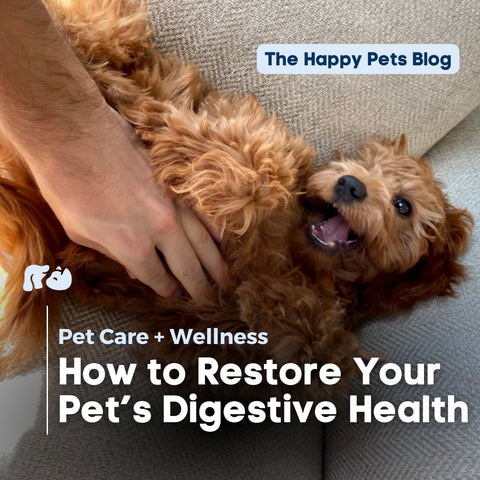
By: Tess Marty & Rianna Young
Did you know 70% of your dog's immune system resides in their gut? A surprising fact, but one of the most impactful things we can do for our pets is supporting their digestive system. Understanding and nurturing your cat or dog’s GI health can significantly enhance their quality of life.
From a healthy diet, to adding supplements and staying away from potential toxins or allergens are just some of the ways to improve gastrointestinal health.
In this article, we will explore the fundamentals of gut health, signs of imbalance, and how to naturally support GI wellness for dogs and cats.
Table of Contents
—Why Your Dog's Gut Health Matters
—Signs of a Healthy vs Unhealthy GI
—Causes of Poor Gut Health in Pets
—How to Calm Digestive Disorders
—Introducing Healthy Bacteria
—Can Stress Lead to GI Problems
—Using CBD for Gut Inflammation
—Balancing Your Dog's Digestion
The Importance of a Healthy Gut
The “gut” is the gastrointestinal tract. It includes where food goes in, to where it comes out, and everything in between. That being said, there are so many different ways to either benefit or upset your pet’s digestive system. The digestive tract serves a role in nutrient absorption, fluid balance, waste removal, and immune function. It can certainly seem overwhelming to keep things regular, never mind fixing it when it goes off balance!
As pet parents, digestive support is one thing that we have a lot of say in for helping to maintain overall health.
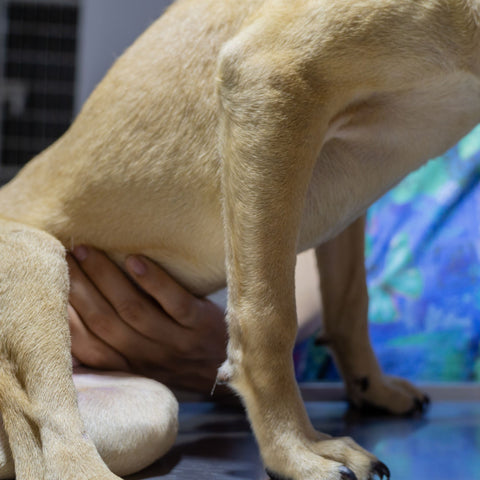
Signs of Healthy vs Unhealthy Gut
Recognizing the signs of a healthy GI system versus an unhealthy one is a key step in keeping our cats and dogs healthy. Signs of a healthy gut include:
-regular bowel movements
-a balanced appetite
-normal weight maintenance
-sustained energy levels
On the other hand, signs of an unhealthy GI system may show up as: diarrhea, constipation, vomiting, excessive gas, bloating, weight loss, lethargy, or changes in appetite or behavior.
Over time, chronic digestive issues can weaken the immune system, impair nutrient intake, and contribute to the development of more serious health conditions like pancreatitis, vitamin deficiencies, or liver disease.
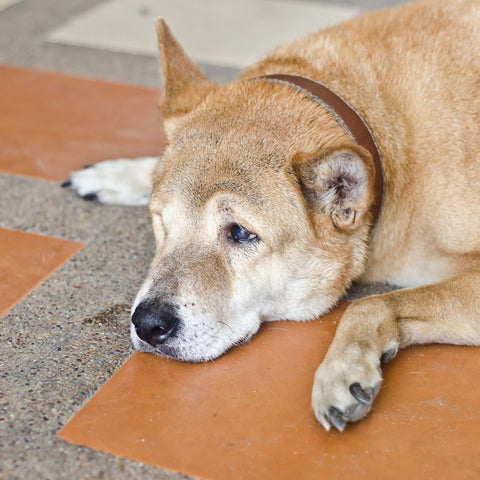
What Causes Digestive Issues In Dogs?
Poor gut health and digestive disorders in pets stems from a variety of factors:
- Diet
- Stress
- Allergies
- Infections
- Medications
- Environmental Toxins
- Underlying Conditions
Underlying medical conditions such as inflammatory bowel disease (IBD), irregular diet, food allergies or sensitivities, infections, medications, or stress. Pancreatitis, or intestinal parasites can compromise gut health in dogs. Highly processed diets with ingredients like grains and artificial additives can disrupt the balance of gut flora.
Just like humans, your pet's health is determined by the balance of microbes in their gut--as we mentioned, 70% of their immune system resides within their gut.
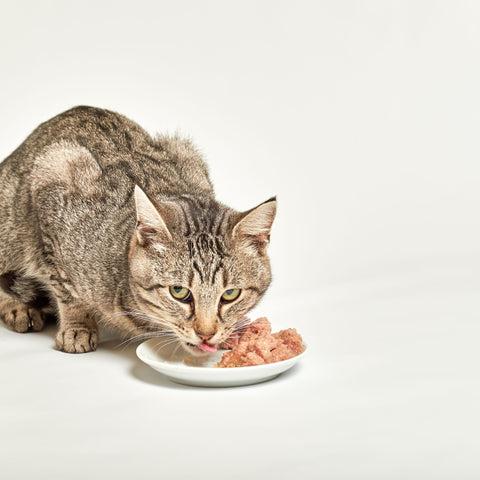
Is There A Difference Between Dog & Cat GI Systems?
While cats and dogs have a pretty similar GI physiology, there are a couple of differences to consider. Cats, as obligate carnivores, have a higher protein requirement and may be more sensitive to dietary changes, while dogs are omnivores and can tolerate a more diverse diet.
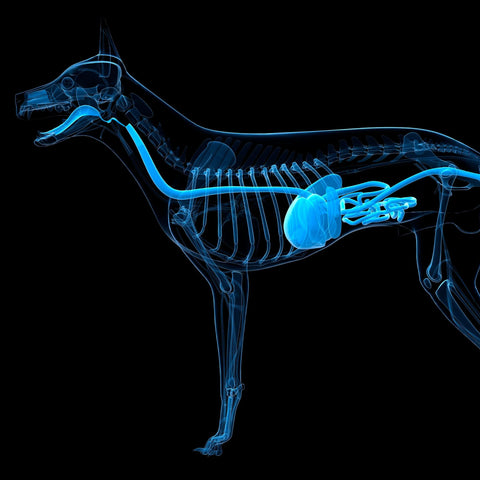
Arachidonic acid is an essential fatty acid that cats can't make on their own, while dogs are able to. This acid produces the signals their body needs to send healing agents of a damaged location to maintain and support proper metabolic function.
Supplementing this necessary acid for cats can be crucial to improving gut health.
How to Calm Pet Digestive Disorders
Here are some of the best strategies to store and balance their GI tract. First on the list is diet, which pays a huge role in tummy health. Investing in high quality foods now will likely save you unwanted vet bills in the future. A dog or cat’s diet has more impact on their long-term health than many other factors.
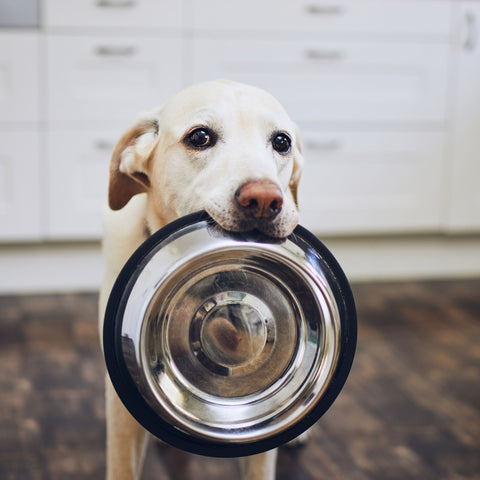
Foods That Can Help Your Dog’s Gut Health:
Different foods can promote gut health in dogs by providing essential nutrients, fiber, and beneficial microorganisms. Incorporating probiotic-rich foods such as yogurt, kefir, and fermented vegetables can support a healthy gut microbiome.
Lean proteins, omega-3 fatty acids, and antioxidants found in high-quality meats and fish further contribute to overall gut wellness in dogs. Fiber-rich fruits and vegetables, such as pumpkin, sweet potatoes, and leafy greens, can aid in digestion and regulate bowel movements.
Along with a clean diet, Happy Hounds CBD has developed tinctures and treats specifically for pets that improves gut health by addressing the symptoms of inflammation, stress, and nausea.
Introducing Healthy Bacteria
Your pet's body naturally produces and hosts healthy bacteria in their GI system, called probiotics. They help break down foods, strengthen immunity, and fight off pathogens. When dealing with stress or illness, the balance of bacteria can be upset. Addressing the root cause of the bacteria upset can help restore digestive health.
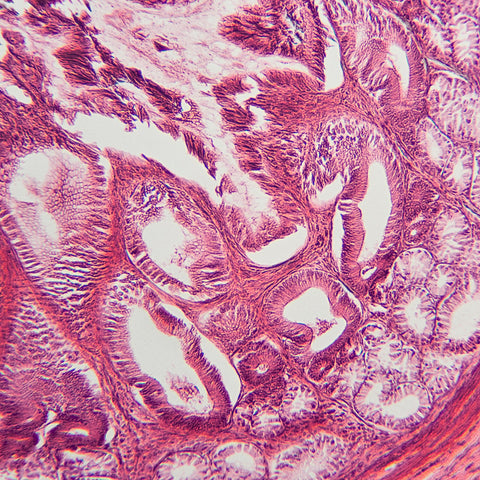
(Dog Stomach Cells, Microscope)
Pre, Pro, and Post Biotics
Incorporating probiotics, prebiotics, and other natural supplements can enhance the healthy gut bacteria in the stomach and aid in nutrient absorption, especially in pets with sensitivities and allergies.
Recent studies have found that skipping pre-biotics, which is a catalyst to create good gut bacteria and going straight for the post-biotics can be a game changer. When you give your dog pre or probiotics you are pushing their biology to create the good microbiome.
A relatively new concept, post-biotics are the result of pre and post biotics without the waiting period or relying on your dog or cat's body to do the work. It's a quicker and easier way to put their digestive system into alignment and a long-term strategy for improving your cat or dog's gut health, naturally.
Can Your Pet's Stress Cause GI Issues?
Managing stress, regular exercise, and keeping your dog's hydrated are essential for maintaining optimal gut health. Adding fiber-rich and gut-soothing supplements or foods to reduce inflammation, like Cannabidiol tinctures supports healing. Many pet parents are turning to CBD to enhance their pet’s GI tract because of its soothing properties on stress and immunity.

Hemp has been shown to help alleviate symptoms associated with GI disorders, such as inflammation, pain, and nausea, helping your pet keep a healthy bacteria level and appetite, and improve the body’s ability to absorb important nutrients.
Long-term use of anti-anxiety medications or sedatives for dogs can have an impact on their liver's ability to breakdown enzymes. If your dog or cat is experiencing separation anxiety or stress-related concerns, consult your veterinarian if a natural solution, like CBD should be considered.
Using CBD for Pet Stress & Gut Health
CBD has been shown to modulate pain perception in animals, which can be helpful for pets experiencing abdominal discomfort or pain associated with digestive issues. Whether it's due to gastrointestinal inflammation, gas, or other problems, Happy Hounds CBD can help reduce pain and improve the overall well-being of cats and dogs.

Cannabidiol (CBD) positive impact on stress and anxiety levels in pets, too, which can indirectly benefit their digestive health. Stress and anxiety can contribute to digestive problems in animals, just like in humans.
By promoting calmness and reducing stress levels, hemp-based dog treats and tinctures can help alleviate digestive issues caused or heightened by anxiety.
CBD & Pet Digestive Disorders
Derived from the hemp plant, using CBD has gained traction for its digestive benefits in both cats and dogs. CBD interacts with the endocannabinoid system, which plays a regulatory role in various physiological processes, including digestion and inflammation. It has an influence on “glucose, amino acid, vitamin, and nucleotide metabolism” as well, according to one study.
Using Hemp to Reduce Gut Inflammation
CBD possesses anti-inflammatory properties, which can be particularly beneficial for pets with digestive issues. Inflammation in the digestive tract can lead to discomfort, pain, and even more serious long-term conditions like inflammatory bowel disease (IBD) and a leaky gut in pets.
Inflammation can be caused by food sensitivities, stress, allergies, or environmental factors. An upset tummy is often related to inflammation of the intestinal tract due to allergens and food sensitivities. When your pet ingests an allergen, the body tries to fight it by inflaming the stomach or intestines.
By reducing inflammation in the digestive tract, CBD can help alleviate symptoms and promote overall digestive health in cats and dogs, helping the body to properly absorb nutrients and function in tip-top shape. Studies on CBD absorption show a positive correlation between reduced stress and inflammation with improved digestive health.

Can CBD Help With My Pet's Appetite and Nausea?
Pets experiencing digestive issues from any of the above factors may have a reduced appetite or suffer from nausea, leading to weight loss and other health concerns. Appetite regulation and nausea can also be caused by age, food sensitivities, or medications and just plain old age.
Known for its ability to stimulate appetite and alleviate nausea, adding CBD drops to your regimen can increase their vigor and ability to eat. A great alternative to anti-nausea medication CBD Oil or Treats can lower stress, reduce inflammation, and regulate appetite to promote relaxation and healing.

Our Calm + Coat drops provide omega-3 rich benefits with Salmon Oil and Turmeric while helping your pets receive the nutrients they need. This is particularly beneficial for cats and dogs undergoing treatments like chemotherapy or dealing with digestive disorders since both can cause nausea and appetite loss.
Restoring Your Dog's Digestive Health
Prioritizing GI health is essential for ensuring the vitality and longevity of your pets. As one of the most controllable factors in their success, we as pet parents have the power to create better health outcomes for our cats and canines.
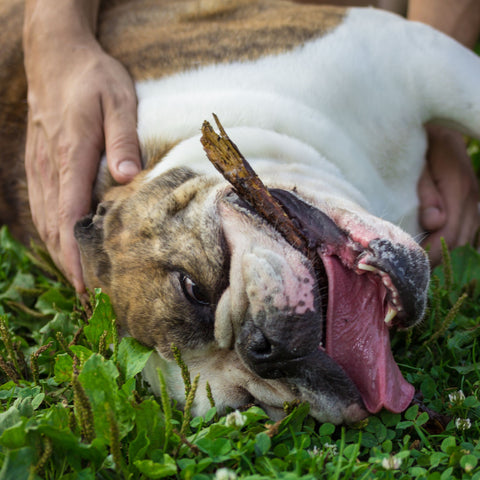
Healing an unhealthy GI tract naturally involves an approach focusing on diet, supplementation, and an active lifestyle. As always, consult with a veterinarian before making any significant changes to your pet's diet or regimen, especially if they have pre-existing medical conditions or are taking medications.
By understanding the basics of gut health, recognizing the signs of imbalance, and carving out a diet that works for them--you can lead the charge in your staving off bigger battles down the road. Laying a foundation for proactive care can go a long way to nurture your dog or cat's gut for long, happy, and healthy life.
